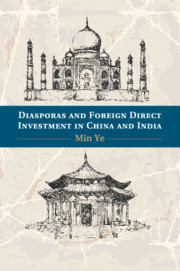Description
Diasporas and Foreign Direct Investment in China and India
Author: Ye Min
A comparative and historical analysis of foreign direct investment liberalization in China and India, explaining how the return of these countries' diasporas affects such liberalization.
Language: English
Subject for Diasporas and Foreign Direct Investment in China and India:
Diasporas and Foreign Direct Investment in China and India
Publication date: 04-2020
Support: Print on demand
Publication date: 04-2020
Support: Print on demand
Diasporas and Foreign Direct Investment in China and India
Publication date: 08-2014
260 p. · 15.7x23.6 cm · Hardback
Publication date: 08-2014
260 p. · 15.7x23.6 cm · Hardback
Description
/li>Contents
/li>Biography
/li>
This book offers a comparative and historical analysis of foreign direct investment (FDI) liberalization in China and India and explains how the return of these countries' diasporas affects such liberalization. It examines diasporic investment from Western FDIs and finds that diasporas, rather than Western nations, have fueled globalization in the two Asian giants. In China, diasporas contributed the lion's share of FDI inflows. In India, returned diasporas were bridges for, and initiators of, Western investment at home. Min Ye illustrates that diasporic entrepreneurs helped to build China into the world's manufacturing powerhouse and that Indian diasporas facilitated their homeland's success in software services development.
Part I. Introduction and Theory: 1. Introduction: foreign direct investment in China and India; 2. Social network theory: diaspora, domestic industry, and diffusion of FDI liberalization; Part II. Reform Stage I: 3. Diasporic entrepreneurs and diffusion of FDI liberalization in China; 4. Deregulation without openness in India; Part III. Reform Stage II: 5. Deepening diffusion: zone fever and SOE reform in China; 6. Transforming Indian business: the foundation and limitation of India's FDI liberalization; Part IV. Sectors: 7. China's electronics and automobiles; 8. FDI liberalization in India's informatics and autos; 9. Conclusion: state, diasporas, and development.
Min Ye is an Assistant Professor of International Relations and the director of the East Asian Studies Program at Boston University. She has served as a visiting scholar and professor in China, Japan, South Korea, Singapore, and India and has taught summer courses at Fudan University, Zhejiang University, and the Chinese University of Broadcasting and Mass Media. Her publications include The Making of Northeast Asia (with Kent Calder, 2010) and various articles published in such journals as the Journal of East Asian Studies, Modern China Studies, and China Public Affairs Quarterly. In China, Ye also serves as a consultant on globalization for private and state-run companies, including Baosteel and CHINT. She is on the advisory board for the construction of the Ocean Economic Development Zone in Zhejiang Province and the Baosteel High-Tech Zone in Guangdong Province.
© 2024 LAVOISIER S.A.S.




